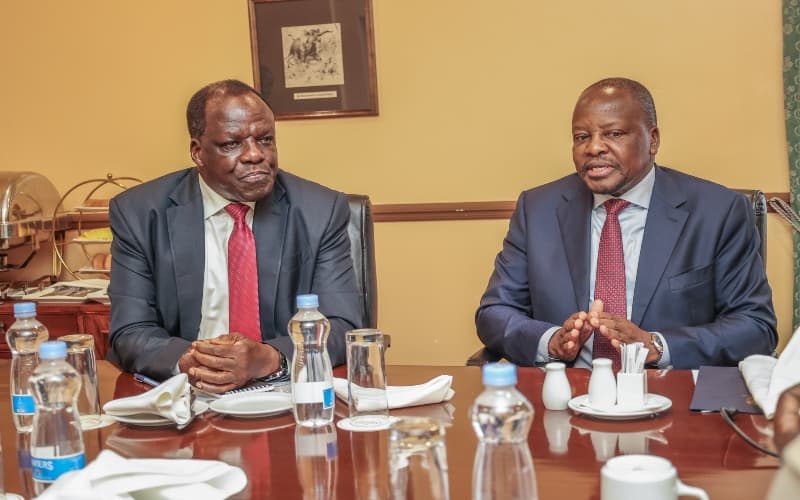We're loading the full news article for you. This includes the article content, images, author information, and related articles.
The Kenyan government is set to introduce an online platform for coffee sales, aiming to connect farmers directly with global buyers and enhance transparency and earnings in a sector long plagued by cartels.

In a significant move to revitalise Kenya's coffee sector, the government has announced plans to launch a digital platform for selling farmers' produce, starting with coffee. This initiative seeks to eliminate exploitation by middlemen and cartels, ensuring that farmers receive fair value for their efforts. The online system will facilitate direct interaction between Kenyan coffee farmers and both local and international buyers through a digital auction.
Agriculture and Livestock Development Cabinet Secretary Mutahi Kagwe, alongside Cooperatives and MSMEs Development Cabinet Secretary Wycliffe Oparanya, revealed the plans on Wednesday, October 8, 2025, in Nairobi. They emphasised that the digital transformation, expected to be rolled out through the Nairobi Coffee Exchange, will introduce transparency and efficiency into the coffee trade.
The Kenyan coffee sector has historically been a cornerstone of the nation's economy, yet it has faced persistent challenges, including low productivity, mismanagement, and exploitation by brokers. In the 1980s, Kenya earned KSh 100 billion from coffee exports, a figure that significantly declined to KSh 40 billion last year. This decline has often been attributed to the opaque nature of the traditional auction system, which has allowed cartels to manipulate prices and deny farmers full returns.
Previous attempts to reform the sector have included the launch of an upgraded system to allow farmers to monitor coffee auctions live from the Nairobi Coffee Exchange, as well as the establishment of the Kenya Coffee Platform to bring together stakeholders.
The proposed digital auction is part of a comprehensive revitalisation programme. Cabinet Secretary Kagwe underscored the necessity of this shift, stating, "Marketing cannot be done the same way year after year and expect different results; it's madness." He added that the online auction would allow international buyers to participate directly, preventing cartels from holding the market hostage and ensuring better prices for farmers through technology.
The government has also warned that stern action will be taken against individuals and cartels found manipulating prices. The sweeping reforms are anchored in the Cooperatives Bill 2024 and the Coffee Bill 2024, which are currently before Parliament. These proposed legislations aim to close governance loopholes, strengthen coordination between national and county governments, and improve farmer representation within cooperative structures.
The initiative has been met with anticipation from stakeholders who have long called for reforms to protect farmers. The direct link to local and international buyers is expected to increase competition and restore confidence in Kenya's coffee trading system. Farmers in 22 counties are already engaged in the revitalisation programme, with modernisation efforts ongoing in 1,176 cooperative coffee factories across the country.
While the digital platform promises significant benefits, analysts are urging clarity on timelines, costs, and safeguards to ensure its successful implementation. The transition to an online system will require robust digital infrastructure and training for farmers to effectively participate. The government's commitment to taking stern action against cartels signals a potential confrontation with entrenched interests that have benefited from the previous system.
Specific timelines for the full rollout of the online platform beyond the initial coffee sector launch remain largely UNKNOWN. Details regarding the technological infrastructure, cybersecurity measures, and support systems for farmers in remote areas are also yet to be fully articulated. The exact mechanisms for international buyer participation and dispute resolution within the digital auction framework will be crucial for its credibility and effectiveness.
The announcement was made on Wednesday, October 8, 2025. Agriculture Cabinet Secretary Mutahi Kagwe is expected to table proposals at the World Food Forum in Rome next week, advocating for independent African coffee markets to enhance farmer earnings and strengthen the continent's global competitiveness.
Stakeholders will be closely watching the implementation phase of the digital auction, particularly its impact on coffee prices and farmer incomes. The effectiveness of the new legislation (Cooperatives Bill 2024 and Coffee Bill 2024) in curbing cartel activities and fostering a more equitable market will be a key indicator of success. Further details on the operational aspects of the platform and farmer training initiatives are also anticipated.
Keep the conversation in one place—threads here stay linked to the story and in the forums.
Sign in to start a discussion
Start a conversation about this story and keep it linked here.
Other hot threads
E-sports and Gaming Community in Kenya
Active 9 months ago
The Role of Technology in Modern Agriculture (AgriTech)
Active 9 months ago
Popular Recreational Activities Across Counties
Active 9 months ago
Investing in Youth Sports Development Programs
Active 9 months ago
Key figures and persons of interest featured in this article